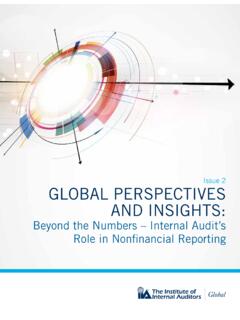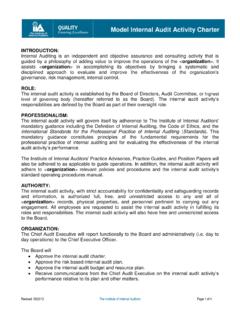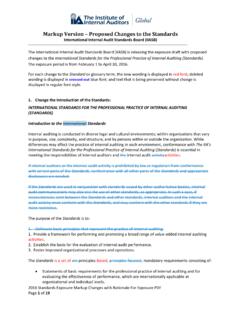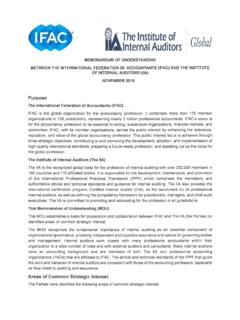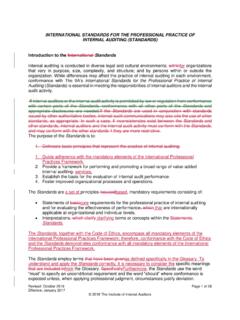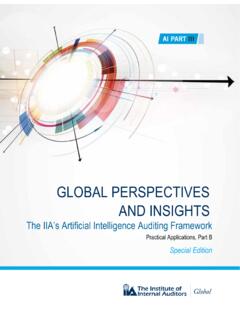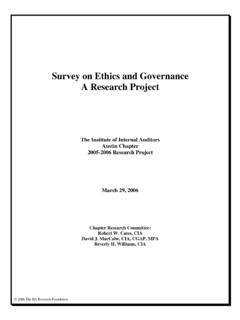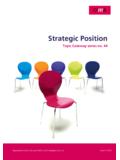Transcription of The IIA’s Global Internal Audit Competency Framework
1 The IIA Global Internal Audit Competency Framework 1 | Page 2013 Institute of Internal Auditors, Inc. About The IIA Global Internal Audit Competency Framework The IIA Global Internal Audit Competency Framework (the Framework ) is a tool that defines the competencies needed to meet the requirements of the International Professional Practices Framework (IPPF) for the success of the Internal Audit profession. A Competency is the ability of an individual to perform a job or task properly, being a set of defined knowledge, skills and behavior. The Framework provides a structured guide, enabling the identification, evaluation and development of those competencies in individual Internal auditors. The Framework outlines the ten core competencies recommended for each broad job level, namely Internal Audit staff, Internal Audit management and the chief Audit executive.
2 Each core Competency is supported by a list of more detailed competencies that further define the core Competency statement. While the core competencies have been defined individually it should be understood that there are connections and interdependencies between all of the competencies. The Framework is designed to be used by: Internal auditors to develop competencies that will help them meet their individual career objectives; Course developers and certification groups within the profession to ensure courses and certifications develop and adequately assess the required competencies; Employers, other professions and the public to use as a point of reference for the purpose of comparison or benchmarking with their own Competency frameworks or to gain a clear and detailed view of the levels of expertise required by Internal auditors; The IIA and its affiliated Institutes to develop strategies to support their position in the international community with respect to standard setting.
3 Students to understand the competencies they would need to demonstrate to be successful Internal auditors and to assist them in assessing their career development plans; The academic community to provide a listing of critical professional competencies to consider in course development to prepare students for entry into the profession; Recruiters and HR professionals to develop appropriate job descriptions and recruit suitably qualified staff. Outline of The Framework The Framework consists of ten core competencies, listed below: I. Professional ethics: Promotes and applies professional ethics II. Internal Audit management: Develops and manages the Internal Audit function III. IPPF: Applies the International Professional Practices Framework (IPPF) IV. Governance, risk and control: Applies a thorough understanding of governance, risk and control appropriate to the organization V.
4 Business acumen: Maintains expertise of the business environment, industry practices and specific organizational factors VI. Communication : Communicates with impact VII. Persuasion and collaboration: Persuades and motivates others through collaboration and cooperation VIII. Critical thinking: Applies process analysis, business intelligence and problem solving techniques IX. Internal Audit delivery: Delivers Internal Audit engagements The IIA Global Internal Audit Competency Framework 2 | Page 2013 Institute of Internal Auditors, Inc. X. Improvement and innovation: Embraces change and drives improvement and innovation The following chart depicts the structure of the Framework and how the core competencies relate to each other: Professional Ethics and Internal Audit Management provide a firm foundation for the delivery of Internal Audit .
5 In order to be able to provide an effective service, Internal auditors need to operate according to high ethical standards and coordinate the resources and activities of the Internal Audit function. The principal points of focus of an Internal auditor s expertise are the IPPF, governance risk and control, and business acumen. The IPPF is the primary source of professional standards for Internal Audit that the IIA provides to all Internal auditors around the world. Additionally, Internal auditors require technical expertise in Governance, Risk and Control to inform their work and help organizations accomplish their objectives. Business Acumen in the form of understanding the client organization, its culture, the way it works, the sector it operates in and the local and Global factors that act upon it is another essential prerequisite that enables Internal auditors to provide effective assurance and advisory services and so add value to the organization.
6 Internal auditors need to be competent in Communication , Persuasion and Collaboration , and Critical Thinking in order to deliver Internal Audit engagements, and drive improvement and innovation in an organization. The IIA Global Internal Audit Competency Framework 3 | Page 2013 Institute of Internal Auditors, Inc. Please Note: In some Competency models (including the previous IIA Framework ) a distinction is made between different levels of competence. This may be a qualitative or quantitative measure indicating a movement from basic awareness to a greater degree of competence. Some scholarly works define different stages of competence, while others defined in such a fashion that an individual may either be described as competent or not (yet) competent. In developing the revised IIA Global Internal Audit Competency Framework ( the Framework ) the task force considered both kinds of approaches and opted in favor of the second of these models for the following reasons: It is a simpler model and is therefore more readily communicated and potentially of greater utility.
7 The most important role of the Framework is to communicate the key areas of competence specific to Internal Audit so as to inform professional development by teams and individuals. The Framework is intended to form a foundation that can be adapted and applied by practitioners, line managers, HR professionals, trainers and others. Given the diversity of professional practice globally there are practical difficulties in devising a Framework that could be regarded as both fully comprehensive and universally applicable. There are conceptual difficulties in accounting for how, with respect to a Competency which relates to effective performance of a job role, an individual may be said to show basic awareness only. It would seem more appropriate to say that either an individual can perform to the required standard or they cannot.
8 Any such model will in any case have a degree of arbitrariness in determining at what point one moves from any given level of competence to the next. As a degree of sophistication it is always possible to build varying levels of competence into subsequent iterations of the Framework if this is regarded as a useful development. This Framework is a living document that will continue to evolve as the profession evolves. The IIA Global Internal Audit Competency Framework 4 | Page 2013 Institute of Internal Auditors, Inc. Ten Core Competencies The IIA Global Internal Audit Competency Framework 5 | Page 2013 Institute of Internal Auditors, Inc. I. Professional ethics Staff Manager CAE 1. Upholds and promotes The IIA s Code of Ethics x x x 2. Applies ethical principles and values to the activities being audited x x 3.
9 Advocates the use of ethical principles and values to the activities being audited x 4. Adheres to the organization s key policies, practices and procedures x x x 5. Speaks with authority on the organization s key policies, practices and procedures x 6. Explains the remit of Internal Audit with respect to the ethical climate of the organization x 7. Assesses and fosters the ethical climate of the board and management x x 8. Treats other fairly without discrimination x x x 9. Maintains objectivity in appearance and fact x x x 10. Discusses ethical conflicts with the chief Audit executive x x 11. Discusses significant ethical conflicts with the board and CEO as appropriate x 12. Investigates ethical issues and proposes measures for resolution x x x 13. Acts with due sensitivity where ethical principles are being abused x x x 14.
10 Takes account of the public interest when deciding upon a course of action x x 15. Exercises due professional care x x x The IIA Global Internal Audit Competency Framework 6 | Page 2013 Institute of Internal Auditors, Inc. II. Internal Audit management Staff Manager CAE 1. Advocates the Internal Audit function and its value throughout the organization x 2. Acts as a role model by exemplifying high performance for team members x x 3. Analyzes own strengths and weaknesses to maximize personal contribution to the organization x x x 4. Anticipates and responds sensitively to staff problems, concerns and questions x x 5. Articulates clear expectations and business goals and links these to organizational strategy x x 6. Sets clear performance standards for Internal auditors and the Internal Audit function x 7.
